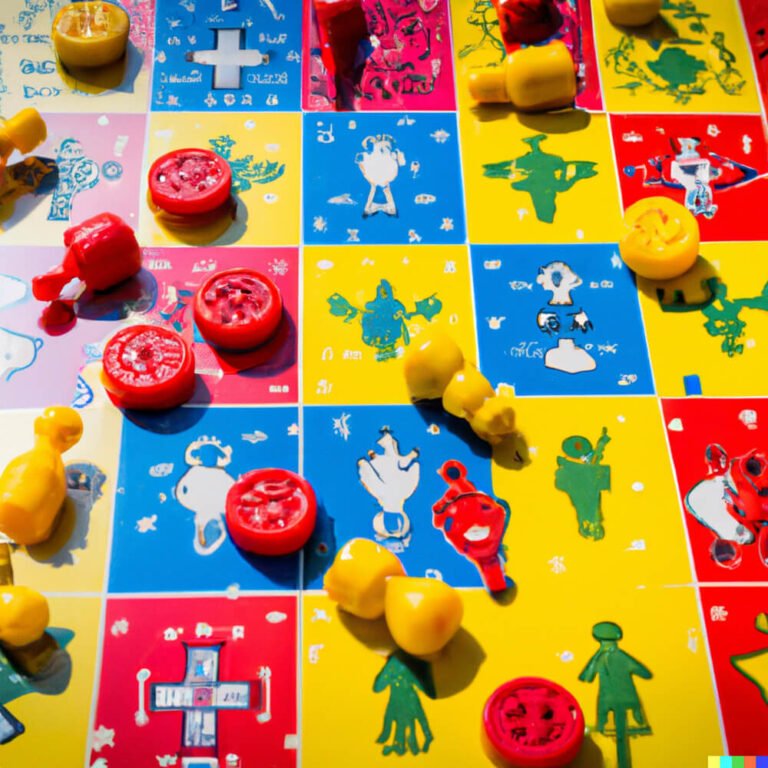The concept of classic board games has been ingrained in the fabric of human history for centuries. From ancient civilizations to modern societies, board games have served as a source of entertainment, strategic thinking, and cultural significance. However, contrary to popular belief, the origins of classic board games were not exclusive to American invention. In fact, these beloved games have roots that span across various regions and time periods, contributing to their diverse and global appeal.
When delving into the history of board games, it becomes evident that they have been a part of human civilization since time immemorial. Ancient cultures from different parts of the world have left behind evidence of their own unique board games, showcasing the universal appeal and enduring nature of this form of leisure activity. As we trace the origins of board games, it becomes clear that they are a product of global influence and historical significance.
Not only do classic board games offer insight into the cultural and historical context in which they originated, but they also serve as a reflection of societal norms and values. Through their evolution over time, these games have adapted to changing tastes and preferences while still retaining their traditional charm.
Furthermore, numerous non-American board games have gained widespread popularity around the world, emphasizing their impact beyond national borders and boundaries. This article aims to explore the diverse origins and global influence of classic board games, shedding light on their historical significance and enduring appeal.
History of Board Games
The history of board games can be traced back to ancient civilizations, where people engaged in various forms of entertainment and recreation. This section will delve into the origins of board games, exploring how they have evolved over time and highlighting their cultural significance.
One of the earliest known board games is Senet, which originated in ancient Egypt around 3500 BCE. This game was played on a grid of 30 squares and utilized pieces that were moved according to the outcome of casting sticks or bones.
Senet held a significant role in Egyptian religious beliefs, as it was believed to represent the journey of the soul through the afterlife. Similarly, the Royal Game of Ur, which dates back to Mesopotamia around 2600 BCE, is another early example of a board game with cultural and religious significance.
In ancient China, the game of Go emerged as one of the oldest board games still played today. Dating back over 2,500 years, Go has had a profound influence on Chinese culture and society. It is revered for its complexity and strategic depth, often seen as an art form rather than simply a form of entertainment. The history of board games from these early civilizations demonstrates their enduring impact on culture and society throughout history.
| Board Game | Origin |
|---|---|
| Senet | Ancient Egypt (3500 BCE) |
| Royal Game of Ur | Mesopotamia (2600 BCE) |
| Go | Ancient China (Over 2,500 years ago) |
Global Influence
Board games have a rich and diverse history that extends far beyond American borders. Throughout the centuries, board games have been an integral part of various cultures, serving as sources of entertainment, education, and social interaction. Their global influence has left an indelible mark on the cultural and historical tapestry of nations around the world.
In ancient civilizations such as Egypt, Mesopotamia, and China, board games were not only a form of recreation but also had religious and symbolic significance. For example, Senet, a popular ancient Egyptian game, was believed to represent the journey of the soul through the afterlife. Similarly, traditional Chinese board games like Go and Xiangqi are deeply rooted in Chinese philosophy and warfare strategies.
The global impact of board games can also be seen in their role in shaping social dynamics and traditions. For instance, in many European countries, board games have been incorporated into holiday festivities and family gatherings as a means of fostering bonding and camaraderie.
Additionally, traditional African board games have played a significant role in passing down cultural knowledge from one generation to another. This widespread influence underscores the universal appeal and enduring legacy of classic board games across different societies.
| Board Game | Origin |
|---|---|
| Senet | Ancient Egypt |
| Go | China |
| Xiangqi | China |
Ancient Board Games
Ancient Mesopotamia
One of the earliest known board games is the Royal Game of Ur, which dates back to ancient Mesopotamia around 2600 BCE. The game was played on a board with 20 squares, and while the exact rules are not entirely clear, it is believed to have been a race game similar to modern-day backgammon.
The Royal Game of Ur also featured beautiful and intricate game pieces, showing that board games in ancient civilizations were not only for entertainment but also had cultural and artistic significance.
Ancient Egypt
In ancient Egypt, the game of Senet was incredibly popular and held spiritual significance for the Egyptians. This game had a grid of 30 squares and players used sticks as dice to determine their moves. Historians believe that Senet was not just a source of recreation, but also played a role in religious practices and beliefs about the afterlife. The game’s symbolism can be seen in many burial sites and tombs throughout ancient Egypt.
Ancient China
China has a long history of developing board games, with some dating back over 4000 years. Xiangqi, or Chinese chess, is one of the most well-known classic board games from ancient China. It features an eight – by nine-point board known as the “river” with playing pieces that represent military formations. Xiangqi remains incredibly popular in China today and has even gained popularity internationally.
These examples illustrate how classic board games have been an integral part of diverse cultures throughout history. From Mesopotamia to Egypt to China, these ancient board games reflect the creativity and ingenuity of civilizations long past, showcasing how games were not just forms of entertainment but also reflected societal values and beliefs.
Evolution of Board Games
Classic board games have a rich and diverse history, with roots that can be traced back to ancient civilizations. Over the years, these games have evolved and transformed, adapting to the cultural and societal changes of different time periods. The evolution of classic board games can be seen in various aspects, from their design and materials to the rules and strategies involved in playing them.
The development of classic board games has been influenced by technological advancements, social trends, and global interactions. As societies evolved, so did their leisure activities, leading to the creation of new board games and variations of existing ones. This constant evolution has allowed classic board games to remain relevant across generations and continue to captivate players around the world.
Some notable examples of the evolution of classic board games include:
- The transition from traditional wooden game boards to modern-day plastic or digital versions
- The incorporation of new themes and settings, catering to different interests and preferences
- The introduction of alternative game mechanics and rule variations, offering players diverse playing experiences
As classic board games continue to adapt and transform, they demonstrate the enduring appeal of this form of entertainment while also reflecting the dynamic nature of human culture and creativity.
Notable Non-American Board Games
Classic board games are a beloved pastime enjoyed by people of all ages and backgrounds. While many popular board games may be associated with American culture, it is important to recognize that the origins of these games extend far beyond the borders of the United States. In fact, some of the most iconic and enduring board games have roots in various cultures from around the world.
Some notable non-American board games that have gained widespread popularity include:
- Chess: Originating in India during the Gupta Empire, this strategic game has evolved over centuries and is now enjoyed by millions of people worldwide.
- Go: This ancient Chinese board game dates back to more than 2,500 years ago and continues to be a revered game of strategy and skill.
- Mancala: With variations found in Africa, Asia, and the Middle East, Mancala is one of the oldest known board games with evidence of its existence dating back thousands of years.
These non-American board games have not only stood the test of time but have also made significant cultural and historical impacts. The global influence of these classic board games reflects the universal appeal and enduring nature of tabletop gaming across different societies.
Furthermore, recognizing the origins of these popular non-American board games serves as a reminder that classic board gaming is a shared human experience with diverse influences from various parts of the world. As society continues to evolve, these timeless games continue to bring joy and entertainment to people across different cultures and generations.
Cultural Significance
Classic board games have played a significant role in various cultures and societies throughout history, serving as not only a form of entertainment but also as a means of social interaction, education, and skill development. Different regions and civilizations have developed their own unique board games, each with its own cultural significance and impact on society.
Ancient Egyptian Board Games
One notable example of the cultural significance of classic board games is found in ancient Egypt. The Egyptians were known to play a game called Senet, which was considered more than just a pastime.
It was believed that Senet had spiritual and religious connotations, with the game being associated with the afterlife. The significance of Senet in Egyptian culture is evident from the fact that game boards have been discovered in tombs, indicating that the game held relevance in their belief system.
Asian Board Games
In many Asian cultures, board games such as Mahjong and Go have held great cultural significance for centuries. Mahjong, originating in China, is not only a popular form of entertainment but is also deeply ingrained in social gatherings and family traditions. Similarly, Go, originating in East Asia, holds strategic and philosophical importance in Japanese and Korean societies. These board games serve as more than just recreational activities; they are integral parts of cultural identity.
European Board Games
In Europe, classic board games like Chess and Backgammon have been instrumental in shaping military strategy and intellectual pursuits for centuries. Chess, with its origins in India, spread throughout Europe during the Middle Ages and became symbolic of medieval chivalry and nobility.
Backgammon, which has roots in ancient Mesopotamia, has been enjoyed by people across Europe for its combination of luck and skill. These board games have left an indelible mark on European culture through their influence on warfare tactics and intellectual development.
The cultural significance of classic board games cannot be overstated; they provide insight into the values, beliefs, and social dynamics of different societies around the world. From ancient civilizations to modern-day communities, these games continue to be an important part of human culture.
Conclusion
In conclusion, classic board games have a rich and diverse history that spans across different cultures and time periods. From ancient civilizations to modern societies, board games have played a significant role in shaping social interactions and providing entertainment. The global influence of board games is evident in the wide variety of games that have originated from different parts of the world, each with its own unique cultural significance.
Furthermore, the evolution of classic board games reflects the changing dynamics of society and the impact of technological advancements. As traditional board games continue to adapt to modern trends, they remain an important part of social gatherings and family activities. Their enduring popularity speaks to their universal appeal and ability to transcend geographical boundaries.
Overall, it is clear that classic board games are not just an American invention, but rather a product of global innovation and influence. By recognizing their diverse origins and cultural significance, we gain a deeper appreciation for these timeless pastimes that continue to bring people together across the world.
Whether it’s chess from India, mahjong from China, or mancala from Africa, classic board games connect us to our shared human history and provide a meaningful link to our collective past.
Frequently Asked Questions
What Was the First Board Game Ever Made in the United States?
The first board game ever made in the United States was “The Mansion of Happiness,” which was created by Samuel Hart in 1843. This game was designed to teach moral lessons to children and became popular during the Victorian era.
Who Invented Board Game?
The concept of board games dates back thousands of years, so it’s difficult to attribute the invention of board games to any one person. However, some early examples of board games were found in ancient Egypt and Mesopotamia, demonstrating that they have been around for a very long time.
Are Any Board Games Made in the USA?
Yes, there are still many board games made in the USA today. Some well-known American board game companies include Hasbro, which produces classics like Monopoly and Scrabble, and Mattel, which makes family favorites like Uno and Pictionary. Additionally, there are also many independent game designers and companies creating unique board games in the US market.

I love playing all kinds of games – from classics like Monopoly to modern favourites like Ticket to Ride.
I created this blog as a way to share my love of board games with others, and provide information on the latest releases and news in the industry.





